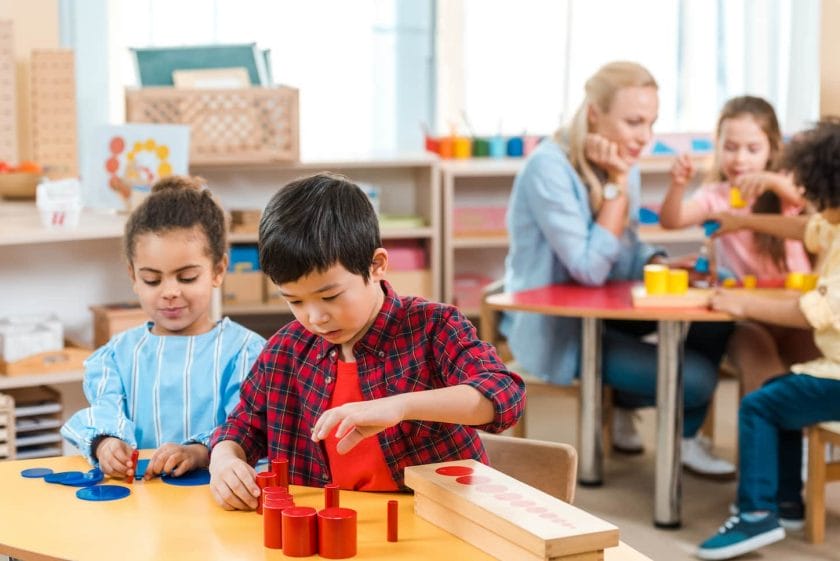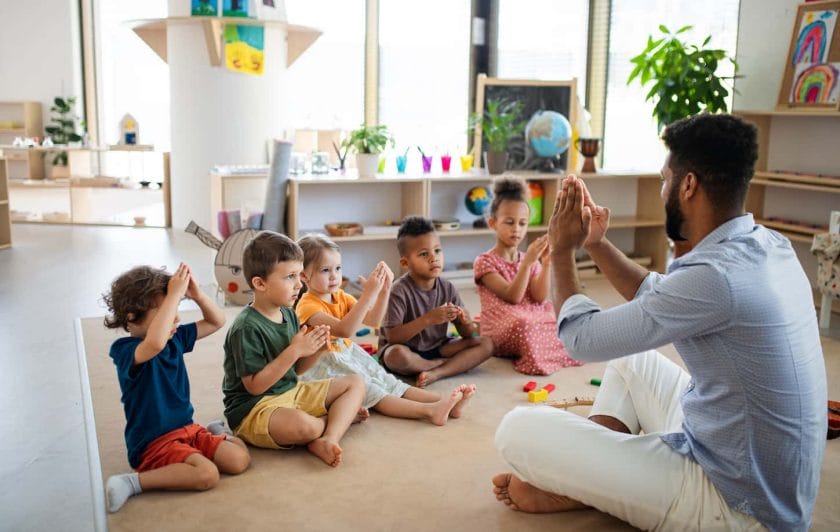There are so many ways of homeschooling that it can be hard to choose which method to try. In this article, we’ll focus on the Montessori method and unschooling. Are you wondering what unschooling means? Well, you are about to find out.
There are eight main differences between Montessori and Unschooling:
- the approach to student-centered learning
- classroom vs. none
- learning in groups vs. in a family or alone
- curriculum structure
- instructors and their training
- socialization of students
- overall cost
- proof and measurement of success
Every child has different abilities and interests. So, what is the best way for them to learn? Is it through reading, listening, or something else? For those new to this topic, we’ll shed some light on the eight main differences between unschooling and Montessori.

Detailed List of Differences between Montessori and Unschooling
First, though, let’s dive into the main differences a little more. That way, you can see why they’re different.
- Approach to the learning process – Educators encourage Montessori students to direct their learning process while unschooled children learn at home with the guidance of a parent.
- Classrooms – Montessori uses specially designed classrooms for the children while unschooled children learn at home.
- Learning in groups – Montessori children usually learn in small groups, while unschooled children learn alone.
- Curriculum structure – Montessori educators create different curriculums for each child based on their interests, while unschooled children create their curriculum with a parent’s help.
- Teachers – Montessori method has educators and teachers who guide and observe the children, while unschooled children don’t have teachers or educators.
- Socialization – Montessori students learn in small groups, while unschooled children learn alone. Both methods encourage individuality but in a different way.
- Cost – Montessori schools are typically more expensive than unschooling.
- Proof and measurement of success – Montessori schools typically have a more thorough way to measure a student’s progress, while unschooling depends on a teacher knowing their student’s needs more intimately.
Is Montessori Similar to Unschooling?
Montessori and unschooling are both methods that inspire independent learning. The child is the one who leads and directs the learning process, not the teacher. It is encouraged that the child learns at their own pace. Montessori and unschooling have an open-minded approach to education.
Montessori, on the surface, shares similarities with unschooling, but the truth is quite the opposite. They are vastly different.
The main goal of both methods is to follow the child’s interests and help them to nurture and develop those interests. The process of learning and discovering new things is more important than the score on the test.
We’ll share the differences a little later, but for now, let’s answer the question every parent is scared to ask: are unschoolers and Montessori students successful?
Are unschoolers successful?
Unschooling can be successful, but some concerns must be addressed. The main worry is that children don’t experience enough socioeconomic and cultural diversity. Another factor is time management. The students aren’t used to deadlines and schedules once they start college or a new job.
The number of homeschooled students is growing every year. A survey showed that most of them are successful, but some parents have several worries and complaints.
Unschooled children seem highly creative and usually choose art-related and entrepreneurial professions. Also, a high number of unschooled children prefer STEM careers.
The high number of children who want STEM careers confirms that nurturing a child’s interest develops creativity and independence in their future professions.
Let’s bust the myth of unschooling: unschooled children are not uneducated. They learn things in untraditional ways and focus on the things that interest them. Peter Gray at Boston College did a study called “A Survey of Grown Unschoolers,” and the results were fantastic (you can read the results here or keep reading as the next paragraph summarizes his findings).
More than 80% of unschooled children pursued some higher education successfully, and only 11% of children had difficulties (usually in math) or didn’t like the overall experience of unschooling.
Are Montessori Students Successful?
Many studies have shown that Montessori children are well prepared for life and their careers. Most of them listen attentively, are responsible, follow directions, show curiosity and enthusiasm, and adapt quickly to new situations. In addition, they score above average on academic skills.
Montessori students, like unschooled children, are very successful. But, despite that, there are also some worries regarding this method.
Again, nothing is ever 100% perfect – one of the complaints is that not every school follows the same Montessori method. This leads to inconsistent studies.
For example, some studies have shown that Montessori students and children educated traditionally have the same outcome; some have even worse results than children from public schools.

Which Is Better: Unschooling or Montessori?
For some children, Montessori is better, and for others, it is unschooling. Every child is different and has diverse needs. The Montessori method is not better than unschooling, and vice versa. Every homeschool method is unique, just like each child.
It’s hard to answer this question. One of the most common dilemmas is what to choose, unschooling or Montessori. However, choosing the proper education method is not easy. As parents, we want to give our children what is best for them.
But one of these methods is better for each child. So, read along the pros and cons of both of these methods. Then, hopefully, it will make the decision easier.
What Are the Pros and Cons of Unschooling?
Public schools don’t traditionally consider the child’s learning style and personality. Unschooling advocates independent learning. Parents provide the child with an environment that will nurture their curiosity, so they lean and learn deeply in their areas of interest.
Unschooling is a philosophy and an education method where children direct their whole learning process at their own pace. Like any other education method, there are pros and cons.
The man behind the whole idea was Jonathan Holt. He believed the students should follow their curiosity, not the curriculum, hence the name unschooling.
There are no deadlines, tests, schedules, or textbooks. Instead, the child chooses the books to read, places they want to visit, people they want to talk to, etc. The parent guides the child through the process of learning.
Before you ask the question, yes, unschooling is legal. But every state has different laws, so check them out for specifics. We’ll go into the generalities that cover most states, though.
Pros of unschooling
Here are the pros of unschooling, and then we’ll go into them in more detail.
- Flexibility and freedom.
- A focus on real-life learning.
- Low pressure.
- Developing a love of learning.
- Multi-level learning.
Flexibility and freedom
The children have the freedom and flexibility to learn and explore anything they find interesting and exciting. At first, it can be a little challenging with a newly discovered freedom, but the child gets used to it very soon.
They start to develop their learning style, and more importantly, they learn at their own pace.
Real-life situations learning
Before going to school, the child learns everything naturally. They learn the facts hands-on, not just how to control or manipulate the situation. Pat Farenga advocates the unschooling method, and his words were: “Get them out of the classroom and into the real world. “
Less pressure
Children are under less pressure because there are no tests and deadlines. Instead, the child and the parent can explore and learn as much as they want or as little about a subject.
Love for learning
The child is the one who leads and directs the learning process. Parents are involved only as guides, not as someone who controls their child. If a child is interested in a subject, it’s natural to want to learn more about it. Then, the learning is easy and joyful.
Multi-level learning
Unschooling allows the child to learn at their level. This is particularly good for families that have multiple-grade children. It’s hard to follow a lesson with students at different grade levels.
But, unschooling allows parents to use the so-called Living Books method, which means learning through literature, not textbooks.
Cons of unschooling
Here is the generally accepted list of cons of unschooling, and then we’ll go into them in more detail.
- Babysitting can be an issue.
- Confusion and chaos can happen.
- No testing means some parents feel lost.
- Friendships can be harder to cultivate without socialization.
- No curriculum means no parental guidance.
- Requirements aren’t spelled out.
Babysitting
If the father and mother work full time, unschooling could be challenging. In this case, they will need to hire a babysitter, which can be inconvenient and expensive.
Confusion
Sometimes, unschooling can feel confusing and chaotic at times. It’s not always clear what should be learned. As a result, many parents without experience with unschooling can feel discouraged and unprepared.
No testing
When it comes to standardized testing, unschooling gives poor guidelines. For example, the child might be interested in subjects from the fifth and kindergarten grades.
Besides that, the child can fall behind one or two levels in some subjects. Without the standardized test, the parents can feel lost.
Friendships
The children aren’t in school with other kids. Sometimes, socialization can be an issue depending on the parent. It is harder to develop social skills if the child is home 24/7.
The child needs to spend time outside, experiencing and learning everything. Also, sometimes this can be difficult for the parent.
For instance, if the parents went to traditional schools, they enjoyed certain ceremonies like prom night and wanted their child to experience the same thing.
No curriculum
Because the unschooling method doesn’t follow any curriculum, parents are concerned their children will have general gaps in learning and education.
Children with a traditional education know a little about everything, but unschooled children learn a lot about a subject they find interesting.
Requirements
Unschooling is legal in fifty states. But every state has different laws. Some states demand testing or more paperwork.
Our children won’t have any diploma after homeschooling, but not every college requires one. However, ACT and SATs can be taken when the child grows up and wants to attend a college requiring diplomas and tests.

What Are the Pros and Cons of Montessori?
The Montessori method is an educational philosophy founded on three principles: individual liberty, observation, and the environment. It’s a teaching method with history and enthusiasm behind it, and it has proven results despite some schools taking individual approaches.
The Montessori method was founded by Dr. Maria Montessori in Italy more than 100 years ago. She structured the technique around the needs of each child. Her primary purpose was to develop the child’s personality through the learning experience.
Unlike unschooling, the Montessori method has a teacher and a classroom. The teacher’s role is observational, not controlling.
The classroom or the environment adapts to children and their personal development. The teacher observes the child and plans the curriculum for each child differently.
The pros and cons will give us some insight into the Montessori method.
Pros of Montessori
Here are the pros of a Montessori-based education, and then we’ll go into them in more detail.
- Self-paced learning is king.
- Group learning happens, too.
- Learning is hands-on.
- Independence is fostered.
- A love of learning is encouraged.
Self-paced learning
Children at Montessori learn at their own pace. It helps them to develop their individuality and confidence because they follow and learn what they like. They are free to explore any activity without boundaries.
Group learning
Children learn in small and mixed-aged groups. This way, older children can guide younger ones if they have difficulties. Younger children can quickly learn by observing older children, while older ones learn how to communicate and help those in need.
Hands-on learning
Montessori classrooms are notorious for their charm and beauty. Every classroom is designed for the children, with a lot of light and space.
Dr. Montessori believed the classroom should be accessible and beautiful so the child can focus on learning. Children have activities and materials that enhance their knowledge and curiosity.
Independence
The learning process is entirely self-directed. That way, children grow their confidence and independence. They are more inclined to critical thinking. It has been shown that Montessori students develop entrepreneurial skills and creative freedom.
Love for learning
Learning becomes an enjoyable process, not a burden. Teachers nurture their love for learning so that later in life, they can connect with different people, situations, and ideas.
Cons of Montessori
Here are the cons of Montessori, and then we’ll go into them in more detail.
- Availability is difficult in some locations.
- Independence can be favored over teamwork.
- Some lack of socio-emotional development is noted.
- Transitioning to other learning styles can be difficult.
- Not all Montessori schools are the same.
Availability
Interestingly, the Montessori method came from the impoverished areas of Rome, and today they are expensive and exclusive private schools. Also, the schools are situated in wealthy neighborhoods, making it hard for low-income families to enlist.
Independence over teamwork
Individual learning is encouraged in Montessori schools. Although the children learn in small groups, teamwork and collaboration are not supported. As we know, collaboration is an essential life skill so children might be unprepared for this.
Lack of socio-emotional development
Montessori children do have better social skills when it comes to problem-solving. But when it comes to their socio-emotional skills, they aren’t very equipped. Unfortunately, this skill is learned through stress.
We all want to protect our children from it, but experiencing stress does make us stronger, and we learn how to overcome it. Children use this tool while learning in public schools.
Transition to high school or college
Transitioning to different learning styles (especially higher education) makes it difficult. The children are used to independent learning, so any schedule or structure is challenging.
Children do tend to struggle during this transition, but they can be okay with time, patience, and understanding.
Inconsistency
Montessori schools are usually criticized for being inconsistent in following the original educational method that Dr. Montessori developed. Schools generally adapt the program to their needs, like learning materials, homework, activities, and many other options.

Key Takeaways and Next Steps
When it comes to children, it’s always a challenge to figure out what is best for them. Unschooling and the Montessori method are alike, but only on the surface. The learning process and the experience are quite different.
Before deciding the best option for your family, consider what educational method your child would enjoy the most. Whatever you choose will be an exciting period for you and the child.
The logistics and the research could be intimidating, but we hope this article will make the decision easier. The first step is always difficult, but the reward after this type of education is priceless.
Want to compare more teaching method philosophies? Read our article, Charlotte Mason vs. Waldorf: What’s the Difference?
Resources
Learning from your own experience is important, but learning from others is also smart. These are the sources used in this article and our research to be more informed as homeschoolers.
- Are Montessori Students Successful Later in Life? www.dallasisd.org/site/default.aspx?PageType=3&ModuleInstanceID=112935&ViewID=9fc4dc78-f943-4224-8465-6c780e58f4df&RenderLoc=0&FlexDataID=169893&PageID=67314. Accessed 12 Sept. 2022.
- “Unschooling Results: Benefits and Problems | Resilient Educator.” ResilientEducator.com, 14 Nov. 2017, resilienteducator.com/classroom-resources/unschooling.
- Hess, Charlene. “What Is Unschooling? Do Unschoolers Turn Out Okay?” Hess Un-Academy, 29 July 2020, hessunacademy.com/what-is-unschooling-do-unschoolers-turn-out-okay.
- iUnschool. “Unschooling: A List of Pros and Cons for Beginners.” iUnschool, 5 May 2019, iunschool.com/unschooling-a-list-of-pros-and-cons-for-beginners.
- Li, Pamela. “Why Montessori Is Bad – the Pros and Cons in Preschools.” Parenting for Brain, 28 June 2022, www.parentingforbrain.com/why-montessori-is-bad.
- Lockett, Eleesha M. “What Is Unschooling and Why Do Parents Consider It?” Healthline, 27 Sept. 2019, www.healthline.com/health/childrens-health/unschooling.
- Lovett, Jessica. “8 Types of Homeschools (Classical, Charlotte Mason, Unschooling, Montessori, and More!).” Home Educator, 5 Apr. 2022, homeeducator.com/homeschool-types/.
- Mead, Sarah. 5 Key Differences Between Montessori and Unschooling. www.whitbyschool.org/passionforlearning/5-key-differences-between-montessori-and-unschooling. Accessed 12 Sept. 2022.
- Meinke, Hannah. “Exploring the Pros and Cons of Montessori Education.” Rasmussen University, www.rasmussen.edu/degrees/education/blog/pros_cons_montessori_education. Accessed 12 Sept. 2022.
- “Montessori Education | Montessori Method and Philosophy.” Our Kids Publications, www.ourkids.net/montessori-education-philosophy.php. Accessed 12 Sept. 2022.
